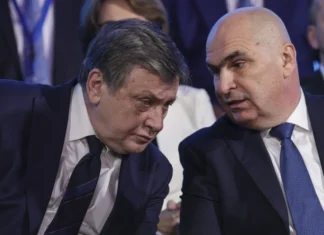In recent developments, Sorin Grindeanu, the prominent leader of the Social Democratic Party (PSD) in Romania, has launched a sharp criticism aimed at the government following the partial withdrawal of U.S. troops from the region. Grindeanu’s comments come at a time when relations with the United States are heavily scrutinized, particularly as they relate to Romania’s security landscape and geopolitical stance.
The backdrop of Grindeanu’s remarks lies in the contentious debates surrounding Romania’s military alliances and the implications of reduced U.S. military presence. His statements highlight a rising concern over what he perceives as „anti-American positions” within certain factions of Romanian political discourse. A notable figure he points to is Oana Gheorghiu, whose recent declarations have sparked considerable backlash from various political actors, including those aligned with the PSD.
Grindeanu argues that such anti-American rhetoric is not only detrimental to Romania’s international relationships but also undermines the nation’s security. He emphasizes the significance of maintaining a robust partnership with the U.S. as a central feature of Romania’s foreign policy. The withdrawal of U.S. troops, even if partial, raises alarms about the potential implications for regional stability, especially in light of persistent geopolitical tensions in Eastern Europe.
The PSD leader’s criticism reflects a broader worry among Romanian political leaders. They stress that Romania has historically relied on its alliance with the U.S. as a cornerstone of its defense strategy. Grindeanu’s statements serve as a call to action, urging political unity in supporting the U.S. presence as a deterrent against potential threats from neighboring countries, particularly in the context of ongoing conflicts that impact regional stability.
Furthermore, the political landscape in Romania is becoming increasingly polarized, with various factions expressing differing views on foreign policy and military collaboration. Grindeanu’s remarks may signify not only an internal party debate within the PSD but also a larger national conversation on how Romania navigates its foreign relations amid shifting global alliances.
The concerns voiced by Grindeanu resonate with many who believe that the geopolitical climate necessitates a strong and unwavering commitment to transatlantic ties. Given the strategic importance of Romania as a NATO member bordering Ukraine, the ramifications of a reduced U.S. military footprint could be significant. Therefore, the dialogue surrounding these issues is critical for Romania’s future security and its role in European and global politics.
Moreover, Grindeanu’s critique of anti-American sentiments aligns with a growing narrative that calls for solidarity among political leaders in defense of Romania’s longstanding alliances. He insists that local political maneuvering should not jeopardize the relationships that have taken decades to cultivate.
As these discussions unfold, it remains to be seen how the government will respond to Grindeanu’s accusations and whether there will be a more unified approach to Romania’s foreign policy. The implications of the current military adjustments will likely shape the political landscape in the months to come, as leaders grapple with the complex realities of international relations and national security—an agenda that will need careful navigation in the face of evolving challenges.
In summary, Sorin Grindeanu’s outspoken criticisms highlight a significant tension in Romanian politics regarding the nation’s security framework and relationships with foreign allies, notably the United States. His appeal for political leaders to reaffirm their commitment to such alliances amid rising political rhetoric underscores the urgent need for a cohesive strategy moving forward.






